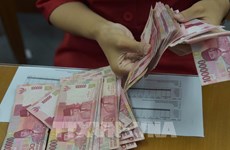Thailand approves 192-mln-USD subsidy to reduce burning of sugarcane fields
Thailand’s Cabinet on May 11 approved a subsidy worth 6 billion baht (192 million USD) for sugarcane farmers who cut fresh cane for sugar factories instead of burning them, in a bid to reduce air pollution caused by the burning of plantations.
 A sugarcane farmer works on a burnt field, a practice that authorities have been attempting to ban in order to reduce pollution, in Suphan Buri. (Photo: Reuters/VNA)
A sugarcane farmer works on a burnt field, a practice that authorities have been attempting to ban in order to reduce pollution, in Suphan Buri. (Photo: Reuters/VNA)The move was proposed by the Industry Ministry, with the Bank for Agriculture and Agricultural Cooperatives (BAAC) chosen to handle disbursement of the subsidy.
The ministry aims to subsidise approximately 300,000 farmers at 120 baht per tonne throughout crop year 2020-2021. The money will be transferred around June to September to BAAC accounts, said deputy government spokesperson Ratchada Thanadirek.
The target of this year’s campaign is to have at least 56 million tonnes of fresh sugarcane fed to sugar factories nationwide, or 80 percent of total cane output, which is estimated at 70 million tonnes throughout the crop year, she said.
During the previous crop year 2019-2020, the programme dispersed a subsidy of 3.45 billion baht to 133,000 farmers, managing to reduce the amount of burnt sugarcane to 49.65 percent of total cane output from 61 percent in crop year 2018-2019.
The programme sets to reduce burnt sugarcane fields from 10 percent of total cane output in crop year 2021-2022 to less than five percent in 2022-2023 and zero in 2023-2024.
Sugarcane remains one of Thailand's most important crops, providing more than 1.5 million jobs and generating more than 180 billion baht per year in revenue. Thailand exports around 70-75 percent of its sugar production and ranks second globally in exports behind Brazil.
The Southeast Asian country has 57 sugar mill factories with a capacity of nearly 984,000 tonnes a day and sugar-cane plantations in 47 provinces spanning over 1.8 million hectares./.












